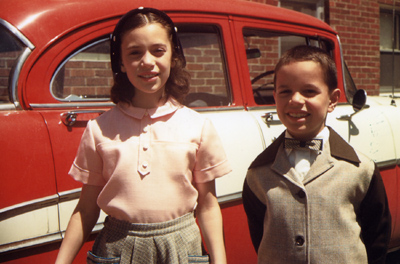By Sandra Bidwell

Sandra Bidwell
|
I am sure the wise legislators who added the words “under God” to our secular Pledge of Allegiance in 1954 expected to reinforce my faith. They needed even small foot soldiers if we were to win the cold war against godless communism. But within a matter of days, their meddling had converted a practicing Presbyterian child to a nine-year-old atheist.
Mrs. Gardner announced the revision to the pledge to my fourth-grade class and proceeded to drill us. We’d recited the phrase “one nation indivisible” every morning for four years, so we all stumbled over the added words and associated pauses. As for me, I couldn’t bring myself to say the new words out loud at all. My Sunday school taught that the word God was to be used only at church and at home, not in public. My face burned with embarrassment for the others as I tried to sort out why my respected teacher was suddenly taking us down this forbidden path. Though I was beginning to doubt the literal accuracy of some of the bible stories taught at our conservative church, I did like the one about the self-important hypocritical Pharisees proclaiming from the temple, and I was sure my classmates should not be shouting “under God” as if it were the school cheer.
When we had perfected our delivery of the modified pledge, we trooped outside to meet up with the other Northwood Elementary fourth-grade class at the flagpole. I felt a growing sense of dread as we marched single file all the way down from our second-floor classroom, out the front door, and down the steep entry staircase to the flag waving in front of our red brick school. I placed my hand over my heart, which was by this time pounding with anxiety, and as we opened our mouths to demonstrate our new skill, I heard myself ask, “Why do we salute the flag, anyway? It’s just a piece of cloth!”
The others paused in surprise. I was certainly surprised. But as she directed the class to continue to recite, the unruffled Mrs. Gardner took me aside and patiently explained what a symbol was, and that the flag represented our great nation and our constitution–the same constitution, I now realize, that promises to keep Congress out of the religion business. I couldn’t tell her about my real concern. I mean, discussing Pharisees with my school teacher would have been like discussing the multiplication tables with my minister. Anyway, I was a kid; this was the Fifties. I’d never had a serious conversation with an adult: They talked, I listened.
Over the next few days, my turmoil grew. At school, I still said the pledge every morning, but I mouthed the God part without saying it out loud. I still felt God’s presence in church on Sunday morning. But at night in my dark little upstairs bedroom, my younger brother asleep in the bunk below, I wasn’t so sure. Was the word God just a word, a word to be used anywhere, just like any other word? Or, like the flag, was it a symbol for something much bigger? In the silent darkness, I closed my eyes and prayed about it, but I didn’t seem to be getting any answers.
Then one night as I prayed, I had a sudden revelation: the reason no one was answering was that no one was listening.
My eyes popped open. The whole room seemed changed, much like religious visions I’d read about. My first thought was that if there was no God, I wasn’t going to get any of the miracles I’d been praying for. My stuffed animal, a droopy hound with orange felt tears running down his nose, that I had been asking God to turn into a real dog? Not gonna happen. But then I thought, there are already some real dogs, and maybe I could convince my parents to get me one. It couldn’t be any harder than asking for a miracle.
And indeed, one day a furry little toy collie mix showed up at my house. Not long after, my threadbare beloved stuffed hound, one felt tear now missing, disappeared from my bedroom. Although I shed a few tears of my own, I didn’t miss him for long. I had a real dog that needed me, a whole real world that needed me.

Sandra and her little brother in 1954, the year the pledge “got religion.”
|
Half a century later, the reference to God in the Pledge of Allegiance is still causing consternation. Recently the Supreme Court decided the Newdow Pledge of Allegiance case on a technicality, leaving for another day the constitutionality of instructing school children to utter the words “under God.” The ruling was a disappointment to atheists, but there is a silver lining. My own experience with the new, improved Pledge of Allegiance 50 years ago shows that bringing religion into the public square can be self-defeating because it diminishes religion’s spiritual mystery. Even Baptist minister Francis Bellamy chose to leave out any religious reference when he wrote the pledge in 1892.
If children repeat the phrase “under God” enough times with no religious context, it can become cheapened and finally meaningless. I, for one, am grateful for having had the opportunity to live my life with my eyes wide open to the splendid physical world around me.
Atheists may even wish to hasten these conversions. We could start responding to that frequently-expressed rhetorical question, “Why do you people object to this harmless acknowledgment of our history, that the US is one nation under God?”
“Why? Because there is no God.” Period. How could anyone object to a harmless statement like that?
Sandra Bidwell is an 18-year subscriber to Freethought Today, and a former electrical engineer.

